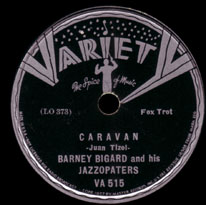Original recording
The first version of the song was recorded in Hollywood in 1936 and performed as an instrumental by Barney Bigard and His Jazzopators. [1] Two takes were recorded, of which the first (Variety VA-515-1) was published. The band members were:
The musicians were members of the Duke Ellington Orchestra, which often split into smaller combinations to record songs under different band names. For this recording, which included Ellington and Tizol as performers, the nominal session band leader was Bigard. As of 2024 this is the most covered song in history, with over 500 versions published. [2]
First measures of
Caravan [3] This page is based on this
Wikipedia article Text is available under the
CC BY-SA 4.0 license; additional terms may apply.
Images, videos and audio are available under their respective licenses.


